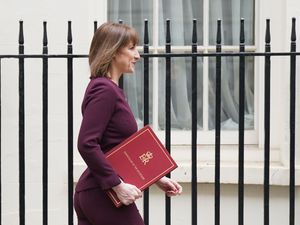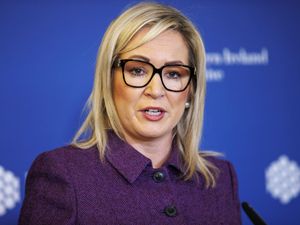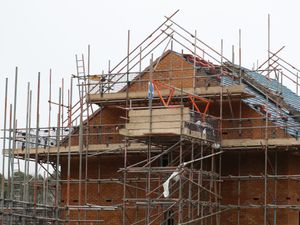Growth forecast halved this year in blow to Reeves
Chancellor Rachel Reeves said she was taking action to grow the economy but said she was battling global instability.
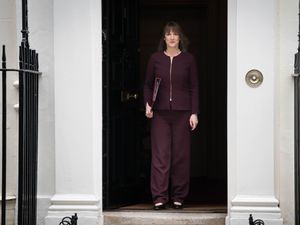
Rachel Reeves has been dealt a blow after the budget watchdog halved its forecast for economic growth, forcing her to cut welfare and squeeze Whitehall budgets.
The Chancellor blamed “increased global uncertainty” and could face further headaches if US President Donald Trump pushes ahead with his plans to slap tariffs on imports, potentially triggering a global trade war.
The Government’s £4.8 billion squeeze on welfare will hit around three million families on incapacity benefits, while 800,000 claimants will have reduced personal independence payments (Pip).
The Office for Budget Responsibility halved its forecast for growth in gross domestic product in 2025 from 2% to just 1%, due to a “lack of recent momentum and waning domestic confidence”.
The watchdog’s assessment also indicated the Chancellor would have missed her goal of balancing the nation’s books in 2029/30 by £4.1 billion without action – which included the welfare cuts, trimming planned increases in Whitehall spending, and planning reforms which are expected to boost growth.
It said she would now meet her target of covering day-to-day spending through tax receipts rather than borrowing with £9.9 billion to spare – the same “headroom” she had in October.
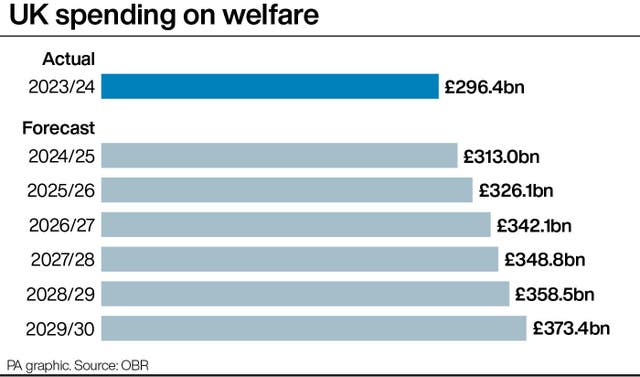
But the OBR said there was a “significant risk” around that forecast, with only a 54% chance Ms Reeves would meet her self-imposed rule given the “very small margin compared to the risks and uncertainty”.
A tit-for-tat trade war, with the UK and other nations retaliating to Mr Trump’s threat to impose 20% tariffs next week, could “almost entirely eliminate” the Chancellor’s headroom – potentially forcing her to hike taxes or cut spending in her autumn budget.
Delivering her spring statement, Ms Reeves told MPs the threat facing Europe had “transformed” since Vladimir Putin’s invasion of Ukraine and “at the same time, the global economy has become more uncertain, bringing insecurity at home as trading patterns become more unstable and borrowing costs rise for many major economies”.
She said the “increased global uncertainty” had impacted both the economy and the public finances.
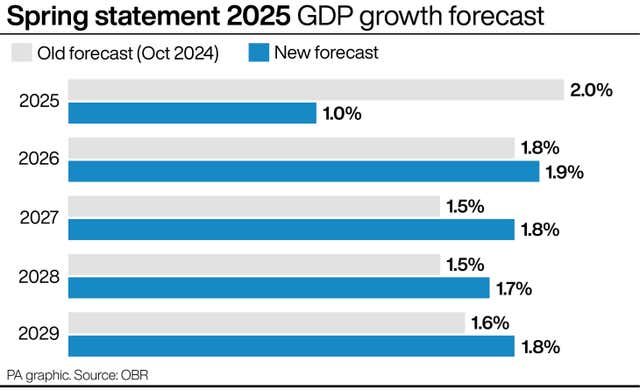
Responding to the OBR’s growth forecast, Ms Reeves said: “I am not satisfied with these numbers.
“That is why we on this side of the house are serious about taking the action needed to grow our economy. Backing the builders, not the blockers.”
Despite the dramatic downgrade in 2025, she said the OBR had upgraded its forecasts for subsequent years with GDP expected to increase by 1.9% in 2026, 1.8% in 2027, 1.7% in 2028 and 1.8% in 2029.
The watchdog also forecast that the Government’s planning reforms will increase GDP permanently by 0.2% in 2029/30, representing an additional £6.8 billion and pushing housebuilding to a “40-year high”.
This will put the Government on track to add around 1.3 million to Britain’s stock of homes in the UK by 2029/30 – but falling short of the target of 1.5 million additional dwellings in England alone by the next election.
In other developments:
– The Government’s own impact assessment of the welfare cuts estimated 250,000 more people, including 50,000 children, will be left in relative poverty after housing costs by the end of the decade.
– The OBR estimated the overall tax burden in the UK is forecast to rise from the equivalent of 35.3% of GDP 2024/25, to a “historic high” of 37.7% in 2027/28, although this is slightly lower than its October assessment.
– Ms Reeves said day-to-day government spending will be reduced by £6.1 billion by 2029/30 compared to previous estimates and it will now grow by an average of 1.2% a year above inflation rather than 1.3%.
– A new £3.25 billion “transformation fund” for the public services will include £150 million for a voluntary redundancy scheme, which can be matched by departments, to reduce the size of the civil service.
– Government borrowing has been revised upwards in every year of the OBR forecast, reaching £137.3 billion in 2024/25, up from £127.5 billion which was forecast in October.
– The watchdog also estimated inflation will average 3.2% this year, before falling to 2.1% in 2026 and then hit the 2% target from 2027.
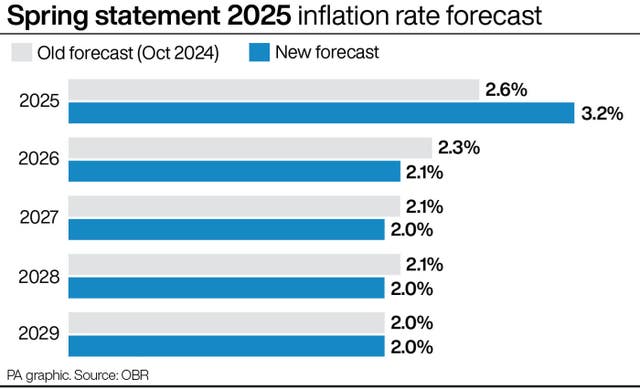
– There was confirmation of the increase in defence spending to 2.5% from 2027, paid for by cutting overseas aid, which also helps Ms Reeves balance the books by tilting the balance from day-to-day resource spending to capital investment in military assets.
– Ms Reeves avoided panic in the bond market after her spring statement, with yields on UK government gilts remaining little changed.
The OBR said the £14 billion of measures to restore Ms Reeves’s headroom back to £9.9 billion came from “direct savings from welfare reforms and the reduction in day-to-day departmental spending” along with the “indirect boost” from measures including the planning reforms.
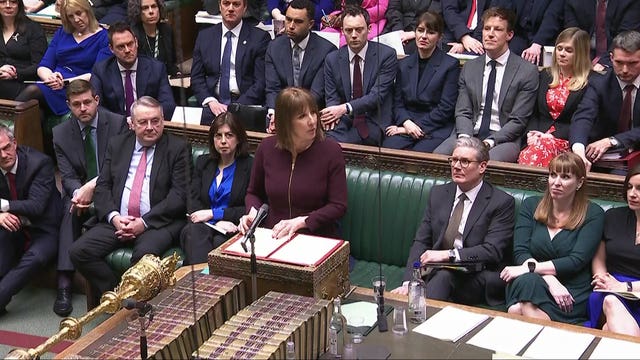
The budget watchdog acknowledged a series of international factors at play, including the risk of a tariff war and increased borrowing costs, but it also highlighted a slump in business and consumer confidence since Ms Reeves’s first budget.
Shadow chancellor Mel Stride told reporters: ” What we’ve seen today has been a moment of reckoning from a chancellor that has mismanaged the country’s finances, and who is trying to tell us that this is due to factors beyond her control.”
The £9.9 billion buffer maintained by Ms Reeves to meet her day-to-day spending rule is small by historic standards and is likely to see further uncertainty ahead of the budget.
Mr Stride said: “What I think we’re going to see now, probably between now and the budget, is quite a lot of speculation about what she may need to do in the autumn if things do not go the way that she hopes they will.”
Institute for Fiscal Studies director Paul Johnson said: “We can surely now expect six or seven months of speculation about what taxes might or might not be increased in the autumn.
“There is a cost, both economic and political, to that uncertainty. The Government will suffer the political cost. We will suffer the economic cost.”

